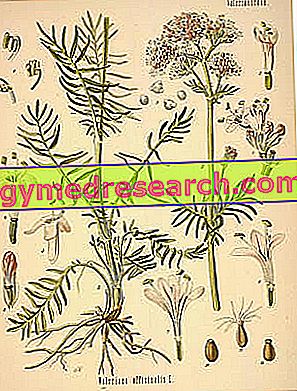Information disseminated by: |
| EMEA (European Medicines Agency) COMMITTEE FOR PLANT-BASED MEDICINAL PRODUCTS (HMPC) VALERIANA OFFICINALIS L., RADIX OF VALERIANA RADIX Summary of the evaluation report of the HMPC for the Summary of the HMPC assessment report for the public |
What are valerian root medicines composed of?

IMPORTANT NOTE: The illustration provided is to give more information on the source of the substance / plant preparation. This illustration is not intended to encourage harvesting in kind.
Valerian root medicines contain the root of the valerian plant. The Latin botanical name of the plant is Valeriana officinalis L. Valerian is a perennial plant found throughout Europe and northern Asia. The plant is cultivated and harvested to obtain the dried root for medical use
Valerian root medicines are available in various forms to be taken orally, such as herbal teas, capsules and drops. They are obtained from various herbal preparations such as the extracts prepared with ethanol which are obtained by placing the root of the plant in contact with ethanol (alcohol) as an extraction solvent.
The preparations obtained from the valerian root are also available in combination with other vegetable substances that have similar effects. The medicinal products resulting from these combinations will be the subject of a separate evaluation by the HMPC.
What are valerian root medicines used for?
The extracts prepared with ethanol are used to relieve mild nervous tension and sleep disorders.
Other preparations based on valerian root are traditionally used to alleviate mild symptoms of mental stress and promote sleep. These instructions for use are based exclusively on traditional use.
The HMPC came to these conclusions after evaluating the bibliographic data available on valerian root preparations. Clinical and non-clinical studies have been carried out mainly from extracts prepared with ethanol, while the use of other preparations is justified by their traditional use as medicinal products of plant origin.
Many traditional herbal medicines have not been subjected to a complete examination with current scientific methods. The Community pharmaceutical legislation provides the opportunity to officially register traditional plant-based medicines, based on their traditional use, if they can be used safely without the intervention of a doctor as regards diagnosis, treatment and follow-up. This traditional use must cover a period of at least 30 years, of which 15 years within the Community.
How are valerian root medicines used?
Valerian root medicines can be used from the age of 12. Not yes
recommends the use of valerian root medicines in children under 12 years of age, as there is not enough information on the safety of the product for this age group. The dosage and frequency of administration of valerian root medicines depend on the purpose for which they are used and the formulation of the medicine in question. For detailed instructions, refer to the leaflet accompanying each individual product.
If valerian preparations are taken to relieve mild nervous tension or stress, they are generally taken up to three times a day. For sleep disorders, the medicine is usually taken half an hour before bedtime. For more information see section 4.2 "Posology and method of administration" of the community herbal monograph on valerian root.
How do valerian root medicines work?
Many components have been found in preparations containing valerian root and it is not possible
precisely define the action of each component.
The components of medicinal products containing valerian root preparations are thought to work by acting on various receptors in the brain. However, studies on the isolated components of these medicines could not fully explain the activity of the medicines; therefore it is believed that different components of the valerian root preparations act together to produce their effects.
The studies described above have been conducted on experimental models, therefore no information is available on how the medicines containing valerian root interact with the human body.
What studies have been carried out on valerian root medicines?
Since the valerian root has been used for a long time, the data examined by the HMPC include the results of studies from the scientific literature, including studies that resort to experimental models.
A considerable body of evidence is available on the use of valerian root medicines containing dried valerian root extracts prepared with ethanol to alleviate mild nervous tension and sleep disorders, as well as numerous studies, some of which have measured activity cerebral via electroencephalograms.
There are few studies on the safety of valerian root preparations, but they are safe from the long experience of their use in humans.
Long-standing use for more than 30 years and limited experimental studies make traditional use plausible to alleviate mild symptoms of mental stress and promote sleep.
No study has been conducted on the effects of valerian root on reproduction, genes or cancer development
What is the risk associated with valerian root medicines?
Generally, valerian root medicines are well tolerated. The most common side effects of valerian root medicines affect the stomach and intestines and are, for example, nausea and abdominal cramps. For the full list of side effects reported for a given medicinal product based on valerian root, see the Package Leaflet.
Valerian root medicines should not be used in people who may be hypersensitive (allergic) to valerian root.
The use of valerian root medicines is not recommended in combination with other sedatives as interactions with other medicines cannot be excluded.
No significant cases of abuse or dependence have been reported. As no tests have been performed on the effects of Valerian root medicines on reproduction or the fetus, as a precaution, these medicines should not be given to women during pregnancy or breastfeeding.
The use of valerian root medicines indicates that they can cause drowsiness and reduce the ability to drive and use machines. Interested patients should not drive or use machinery.
More information on valerian root medicines
The use of valerian root as a medicinal product is part of traditional European herbal medicine.
Regarding the extracts prepared with ethanol, the bibliographic data did not allow the HMPC to formulate scientific conclusions regarding their rational use.
Important information on the use of a traditional plant-derived medicine can be found in the leaflet accompanying each individual product. This information should always be read carefully before using a product.



